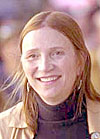Religion on the Brain: California ScienCenter event
 The first event in the California ScienCenter’s “Science Matters” series was Religion on the Brain, held on November 4, 2006. It was attended by a thousand people. What an outpouring of interest in the biology of religion! What were these people looking for? Judging from the questions from the audience, some appeared to be scientists, but most were “seekers” in the informal sense—still trying to figure out what all this means. I doubt they were satisfied.
The first event in the California ScienCenter’s “Science Matters” series was Religion on the Brain, held on November 4, 2006. It was attended by a thousand people. What an outpouring of interest in the biology of religion! What were these people looking for? Judging from the questions from the audience, some appeared to be scientists, but most were “seekers” in the informal sense—still trying to figure out what all this means. I doubt they were satisfied.
The selection of panelists looked promising: VS Ramachandran, as well as Joan Roughgarden (pictured) from Stanford (author of “Evolution’s Rainbow”), Michael Schermer (Wikipedia ) of the Skeptics Society, and Warren Brown (link), a psychologist and writer on science and religion issues.
Unfortunately, this panel ended up generating neither much heat nor light. VS was given a brief 15 minutes to present some basic research on the brain and religion, then Conan Nolan (bio), a reporter who served as the moderator, dove right into a series of unstructured questions.
Schermer, with whom I’m not familiar, is an agnostic, but apparently adopts a very simplified sociological/anthropological view of the origins of religion. The narrator failed to ask him to clarify his views on the differences between a brain-based view of religion and a societally-based one (or, to state the question another way, which aspects of religion might be brain-based and which societally-based).
We never managed to figure out what Joan Roughgarden’s agenda was, since all we heard from her were answers to ad hoc questions. Judging from those, she seems to be missing a few marbles. She claims that neurobiology (I guess she meant neuroimaging) is over-resolving. In other words, it’s seeing stuff that’s not really there? Or the stuff it’s seeing is random, or doesn’t matter? She made the incredibly odd analogy that having a religious experience is like eating a chocolate bar, and of course both affect your brain. Does it really take a PhD to figure out all the ways that eating a piece of chocolate is distinct from thinking you’ve seen God? Then she made the startling asserting that there’s nothing really extraordinary about the relationships between the brain and God. One is left to assume—she never bothered to tell us—that she thinks that God is out there somewhere and we use our brains to perceive Her in the same way we use them to perceive a butterfly. If she believes that, why did she bother to accept the invitation to the panel discussion?
We know from the blurb on her new book “Evolution and Christian Faith” that she’s “an evolutionary biologist and a Christian,” and the book “offers an elegant, deeply satisfying reconciliation of the theory of evolution and the wisdom of the Bible.” She has “scoured the Bible and scanned the natural world, finding examples time and again, not of conflict, but of harmony.” In a way I’d sort of like to read this book, but unfortunately I have to draw the line somewhere. Her previous book, “Darwin’s Rainbow,” which discusses evolution and sexual diversity, might be more fun.
Nor was Warren Brown, from Fuller Theological Seminary, given any more of a chance to say what he thought, which is apparently something about of the integration of neuroscience and Christian faith. He has edited a book called Whatever Happened to the Soul, which is said to present a nonreductive physicalist Christian anthropology, whatever that might be.
What was missing at this forum was your basic unapologetic reductionist. Ramachandran doesn’t fill the bill: he resolutely refuses to take a stand on whether God really exists. He even, in answer to a softball question about whether a future God pill would or would not give rise to ethical issues, refused to answer on the grounds that that was not a scientific question.
Perhaps in the future such worthy events can be better planned, better structured, and better executed, perhaps with the participation of a leading blogger about religion and the brain. 🙂
